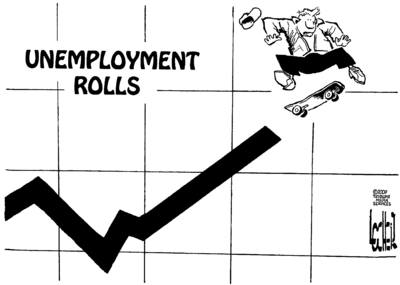- MENU
- HOME
- SEARCH
- WORLD
- MAIN
- AFRICA
- ASIA
- BALKANS
- EUROPE
- LATIN AMERICA
- MIDDLE EAST
- United Kingdom
- United States
- Argentina
- Australia
- Austria
- Benelux
- Brazil
- Canada
- China
- France
- Germany
- Greece
- Hungary
- India
- Indonesia
- Ireland
- Israel
- Italy
- Japan
- Korea
- Mexico
- New Zealand
- Pakistan
- Philippines
- Poland
- Russia
- South Africa
- Spain
- Taiwan
- Turkey
- USA
- BUSINESS
- WEALTH
- STOCKS
- TECH
- HEALTH
- LIFESTYLE
- ENTERTAINMENT
- SPORTS
- RSS
- iHaveNet.com: Economy
by Liz Wolgemuth

These cities are expected to suffer very high unemployment a year from now
It sure sounds like the Great Depression in El Centro, Calif. In this city near the Mexican border, the unemployment rate hit a whopping 30.1 percent in September, the
The jobs picture is so different in some cities that they would hardly seem to be in the same country. In Bismarck, N.D., the unemployment rate was 2.9 percent last month. Personal income in North Dakota grew more than in any other state in the second quarter -- 1.5 percent, compared with 0.2 percent nationally. While the nation's job market is awful overall -- thousands of Americans are exhausting their unemployment benefits daily -- it's clear that the true jobs picture is as varied as the nation's topography. With the promise of a recovery on the horizon, new data show that the employment upturn will be regional as well.
According to a new forecast from IHS Global Insight, unemployment rates in some cities will remain stubbornly high a year from now. As many as 16 cities -- in California, Michigan, Arizona, Florida, Illinois, and Indiana -- will have unemployment rates higher than 15 percent in the fourth quarter of 2010. Some of those cities were among the hardest hit by the housing market crisis or had economies highly dependent on manufacturing, IHS reports.
In El Centro, unemployment will be as high as 26 percent next year, IHS estimates. "In the central valley of California, unemployment rates are very much affected by the agricultural economy," says Jim Diffley, regional group managing director at IHS. Other California cities where IHS says unemployment will stay above 15 percent include Merced, Modesto, Fresno, Redding, Stockton, and Hanford-Corcoran. While unemployment rates are driven by the makeup of regional economies, they are also greatly affected by demographics. "Younger or more immigrant-prone areas have always had higher unemployment," Diffley says. In other words, don't interpret El Centro's high unemployment rate as an indication that it has been the city most affected by the recession.
Michigan cities dependent on the auto manufacturing industry -- namely Detroit and Flint -- are expected to suffer high unemployment for a protracted period. Perhaps more surprising is that the job market in a city such as Rockford, Ill., is forecast to worsen over the next 12 months. Rockford now has a 15.2 percent unemployment rate, which IHS expects will move closer to 17 percent by the fourth quarter of next year. Elkhart, Ind., saw its unemployment rate rise as sales of recreational vehicles made in local factories began to slide. IHS estimates Elkhart's unemployment rate will remain above 15 percent through the end of 2010. Joblessness will very likely be prolonged by corporate America's proclivity -- and ability -- to do more with fewer workers. One hopeful possibility, however, is that because this recession's job cuts were so steep, employers may be forced to increase hiring to keep up operations when the recovery begins.
The economies of metro areas in the central part of the country -- from Texas to Montana -- have held up better in this recession. That's partly because they didn't experience the same housing boom and bust that was seen in parts of Nevada, Florida, and Arizona. Many areas were insulated by their supply of natural resources, despite the volatility in commodity prices. And given that income levels in the central states have grown more than in the rest of the nation, they will be the first to recover from the recession, Diffley says.
What does all this mean for job seekers? Although Bismarck's unemployment rate is the lowest in the nation, the unemployed shouldn't necessarily take flight for North Dakota. They won't find much churn to open up opportunities. "I'd head to Texas," Diffley says.
© U.S. News & World Report
WORLD | AFRICA | ASIA | EUROPE | LATIN AMERICA | MIDDLE EAST | UNITED STATES | ECONOMY | EDUCATION | ENVIRONMENT | FOREIGN POLICY | POLITICS
Economy: Cities Where Jobs Recovery Will Be Slowest - Liz Wolgemuth